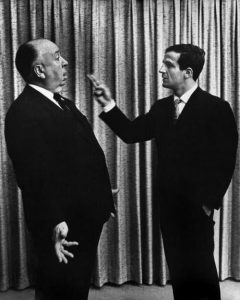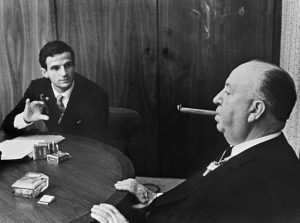Interview: Kent Jones on the Documentary “Hitchcock/Truffaut”
Posted on December 15, 2015 at 3:36 pm

If you are very lucky, some day a book will change your life. And no book changed my life more profoundly than Hitchcock/Truffaut, a book-length interview of one of the world’s greatest movie directors by another who happened to be a former film critic and scholar. I was a movie-mad teenager when someone suggested this book to me, and it completely transformed the way I watched and thought about movies. So I was thrilled to see the wonderful new documentary “Hitchcock/Truffaut” by film critic/historian Kent Jones, with some of today’s greatest directors talking about how the book and Hitchcock’s work influenced and inspired them.
In an interview, Jones talked about his choice for the movie’s narrator, actor/director/screenwriter Bob Balaban. “I wanted only filmmakers in the movie. I didn’t want any experts or historians or actors or anything like that. I just wanted filmmakers because it was a dialogue between filmmakers. And so I wanted ideally somebody who was a filmmaker as well to be the narrator and Bob of course you know in addition to being an actor and director of movies and beyond that Bob also was Truffaut’s friend. They became good friends when they made ‘Close Encounter of the Third Kind,’ so for all those reasons and also I like Bob and I like his voice.”
The documentary includes some scenes with the translator who worked with the two men because their only real common language was the language of cinema. “It’s interesting, there’s a good rapport between the two of them and you could say between the three of them because she is very much a part of the conversation, in and of itself. There are moments when she and Hitchcock are talking. She was really attached to Truffaut as a friend, as a filmmaker, someone who was really smitten with him as a human being. But I don’t think that it really impeded the flow, I mean they had a good rapport. They were both filmmakers and the trends of the conversation were very clear. On the other hand there’s a lot of stuff that she gets wrong, like the names of certain film producers for instance when they were trying to talk about what movies he’s seen and what he hadn’t seen when he was young. There are different titles in different countries so try to figure out what movie it they were talking about was a little bit of a challenge. I think also Hitchcock understood French, he actually spoke it. But nonetheless throughout the tape, even in the movie when he’s talking about vertigo he doesn’t say ‘necrophilia’ he says ‘necrophilie’. You know he inserts a little French pronunciation. Truffaut on the other and really didn’t understand English but having said all that I think the flow of their conversation is pretty seamless.”
While Hitchcock was still dismissed as a genre director in the US of the 1960’s, the French “new wave” filmmakers and critics were the first to take him seriously as a master of cinematic storytelling. “What we call ‘auteurism’ now is very tied into the distance of time and the distance of space. It is very important that it was a group of people from across the Atlantic looking at America through different lens, looking at American filmmaking through their own lens. Obviously Hitchcock wasn’t alone, Nick Ray, Howard Hawks and all these people. Even people who say ‘I hate auteurism; it’s ridiculous’ when they write their reviews nonetheless they’ll refer to Michael Bay’s ‘Transformers 4.’ I mean they don’t know it but they have been transformed by the idea. And so I think that’s always a great thing when somebody gets people to accept something in a new light and gives people a new way of seeing the work that they thought that they knew. I think that that’s a great thing and it’s just really fruitful in this case, it just kind of opened the door to a really exalted idea in cinema.”

We agreed that the Montgomery Clift film, “I Confess” is one of Hitchcock’s underrated gems. Clift plays a priest who learns of a murder in confession and then himself becomes a suspect but cannot reveal what he has heard. “I love ‘I Confess.’ I think it’s great. Maybe you could say that in some of those 50’s movie things get a little telescoped at the very, very end. I really love the atmosphere of it, I love Clift, I love the presence of Québec City in the movie. I thought that those flashbacks were incredibly beautiful. It’s the film that my mother loved.” Jones objects to some of the conventional wisdom that Hitchcock did not work well with actors. He spoke about the special relationship Hitchcock had with Grace Kelly, James Stewart, and Cary Grant, who gave some of their best performances in his films. “Doris Day gives her most interesting and vulnerable performance in ‘The Man Who Knew Too Much,’ better than in ‘Love Me or Leave Me’ just riveting.”
Jones was reluctant to pick a favorite Hitchcock film because he likes to look at it as a body of work. “Within the history of Hollywood studio system of filmmaking, that’s the best body of work there is bar none. I mean the only body of work that I can think of that is kind of like it in terms of somebody working into the studio system where every film is as good is Yasujirō Ozu. There is no movie that he ever made that was at second gear, ever. And having said that I don’t know, I could narrow it down to about 10 or 12 or something maybe ‘Notorious’ or ‘Vertigo’ or ‘Rear Window.’ I don’t know it’s impossible for me.”
